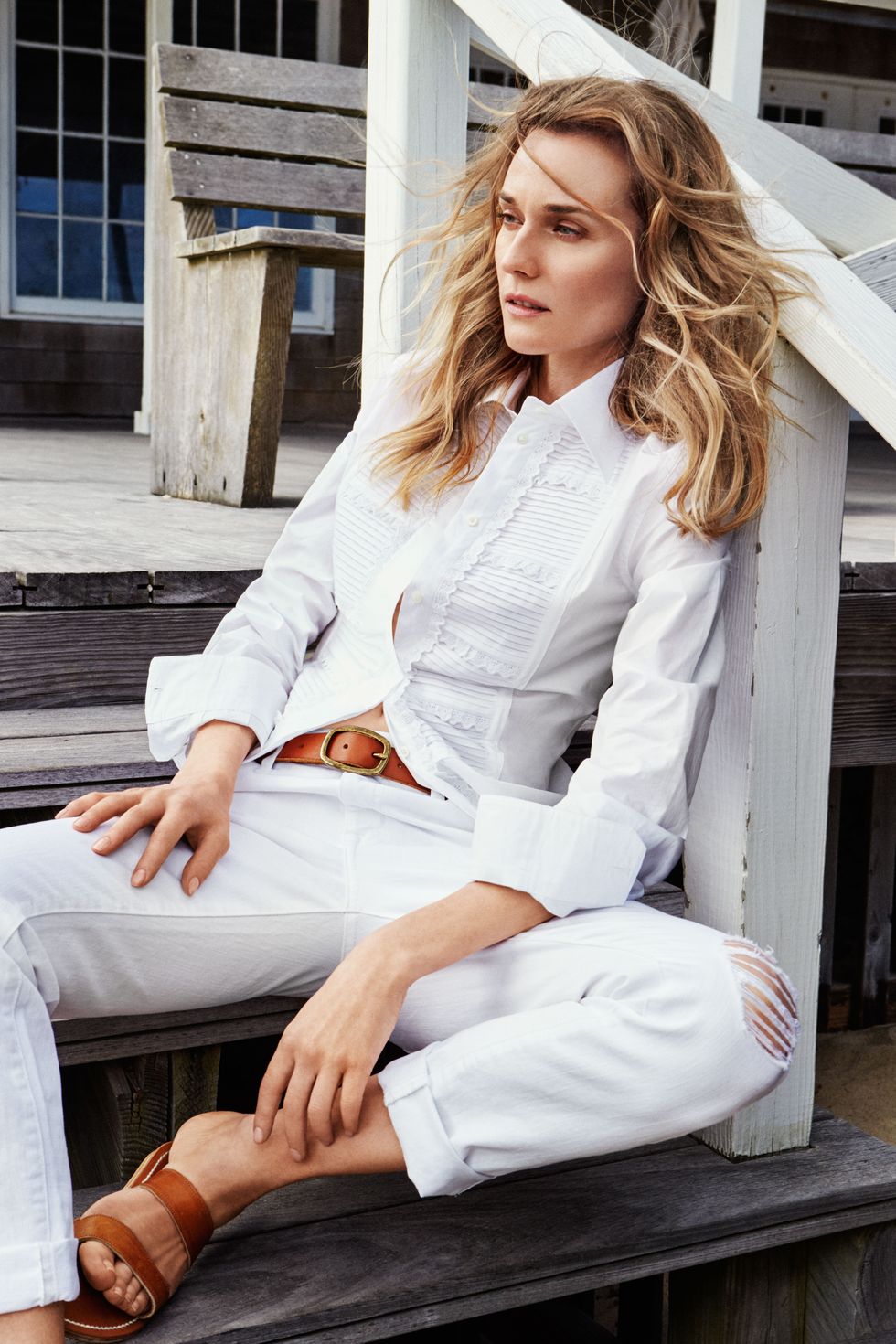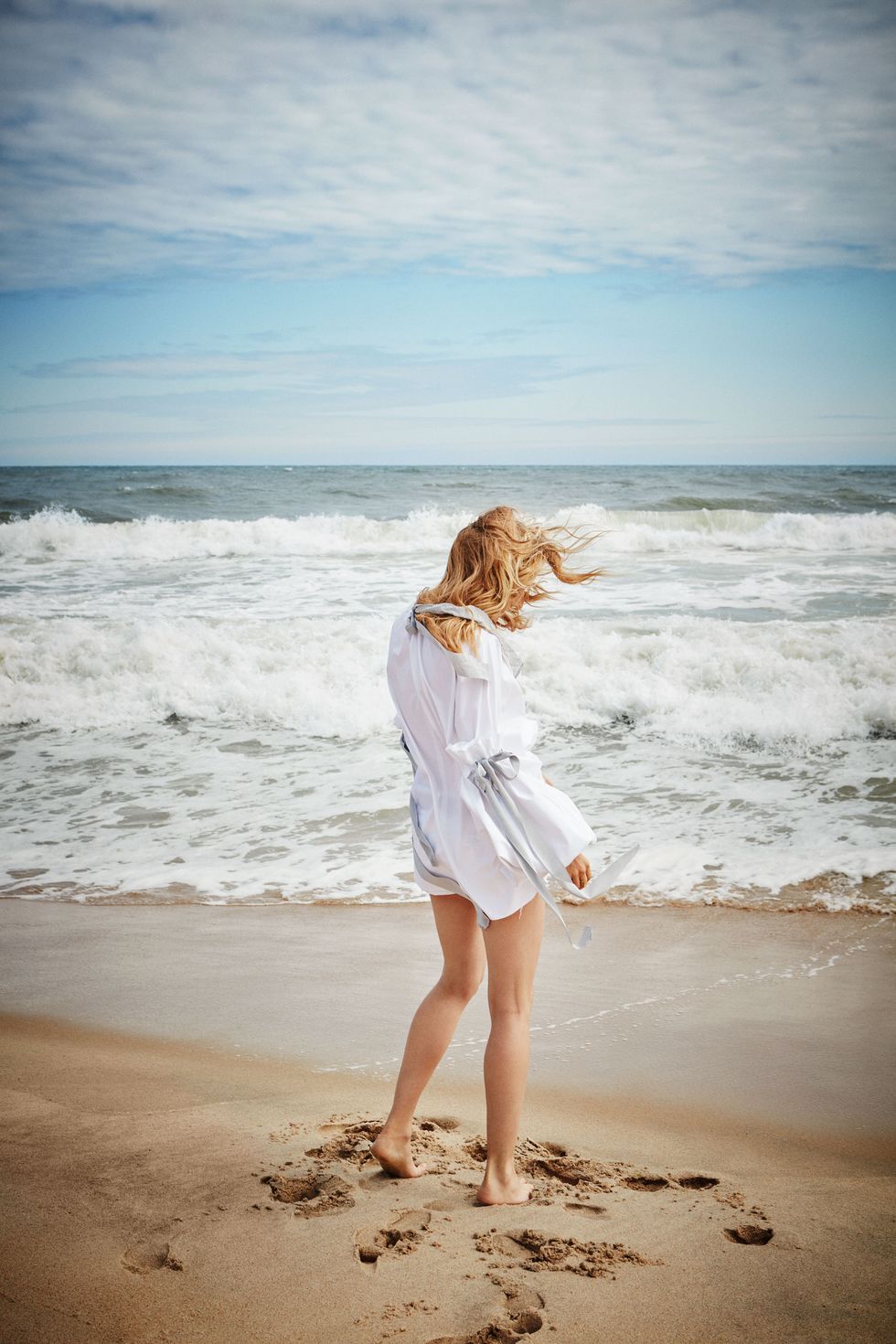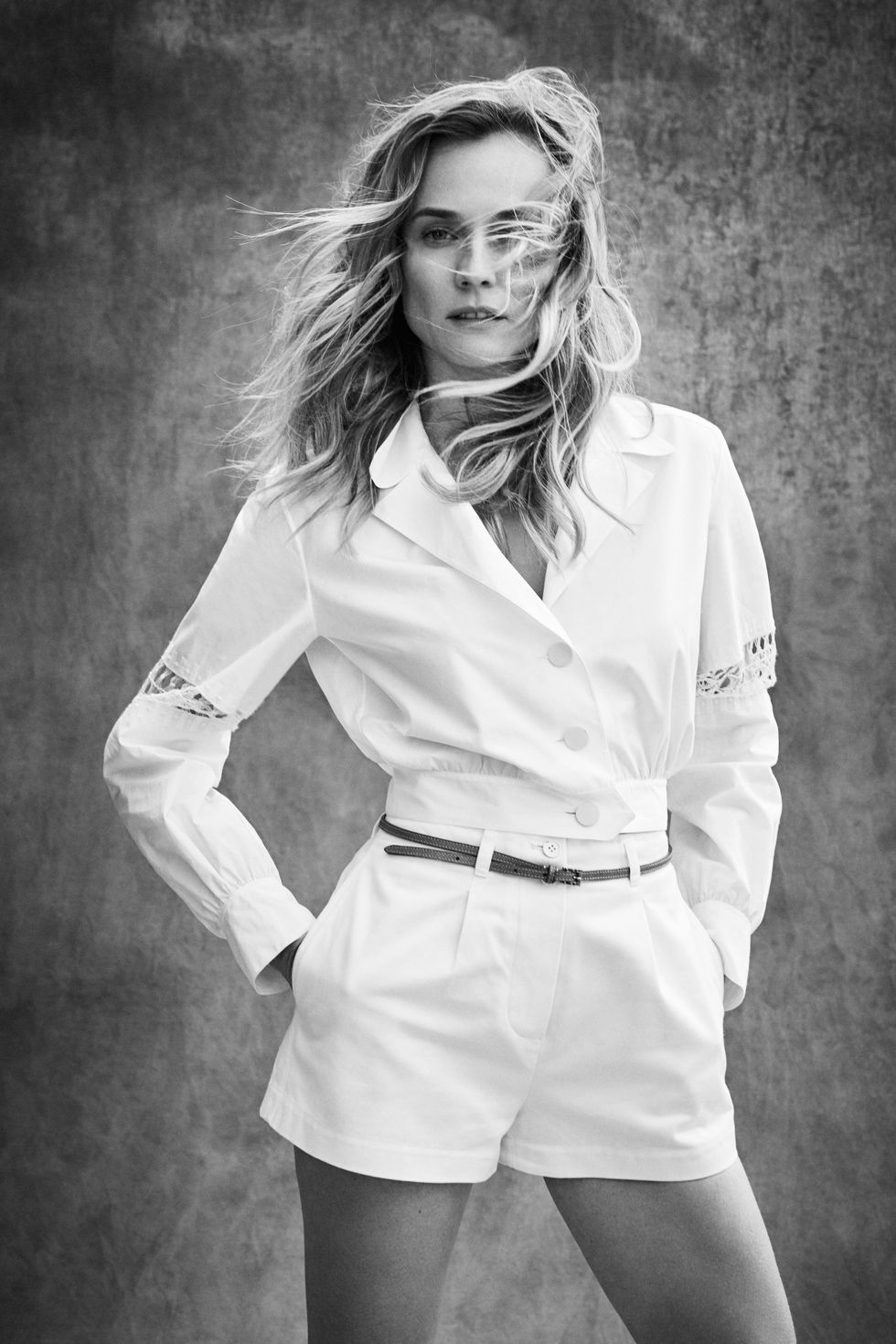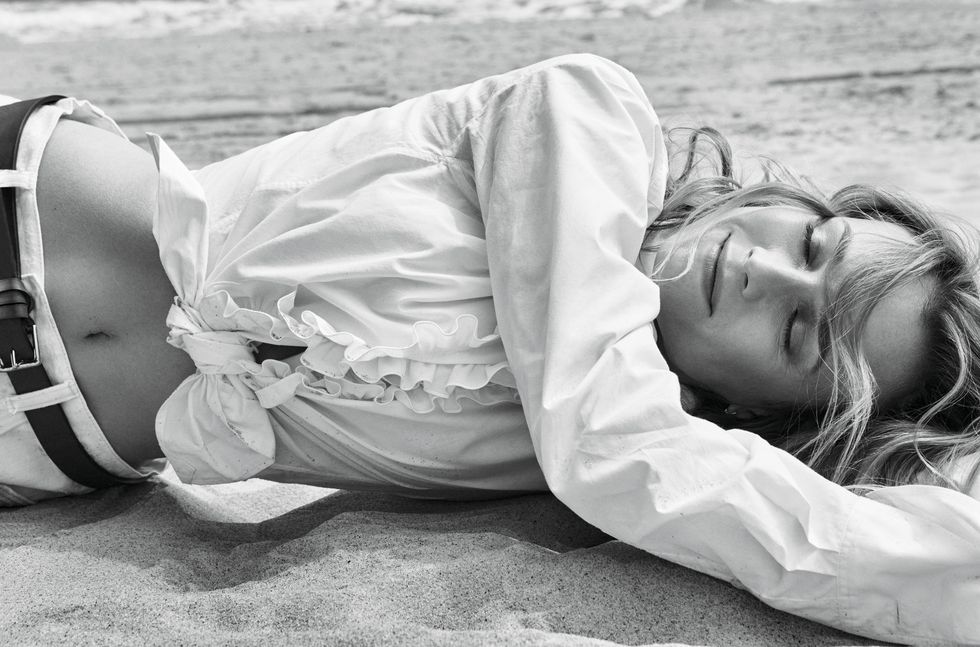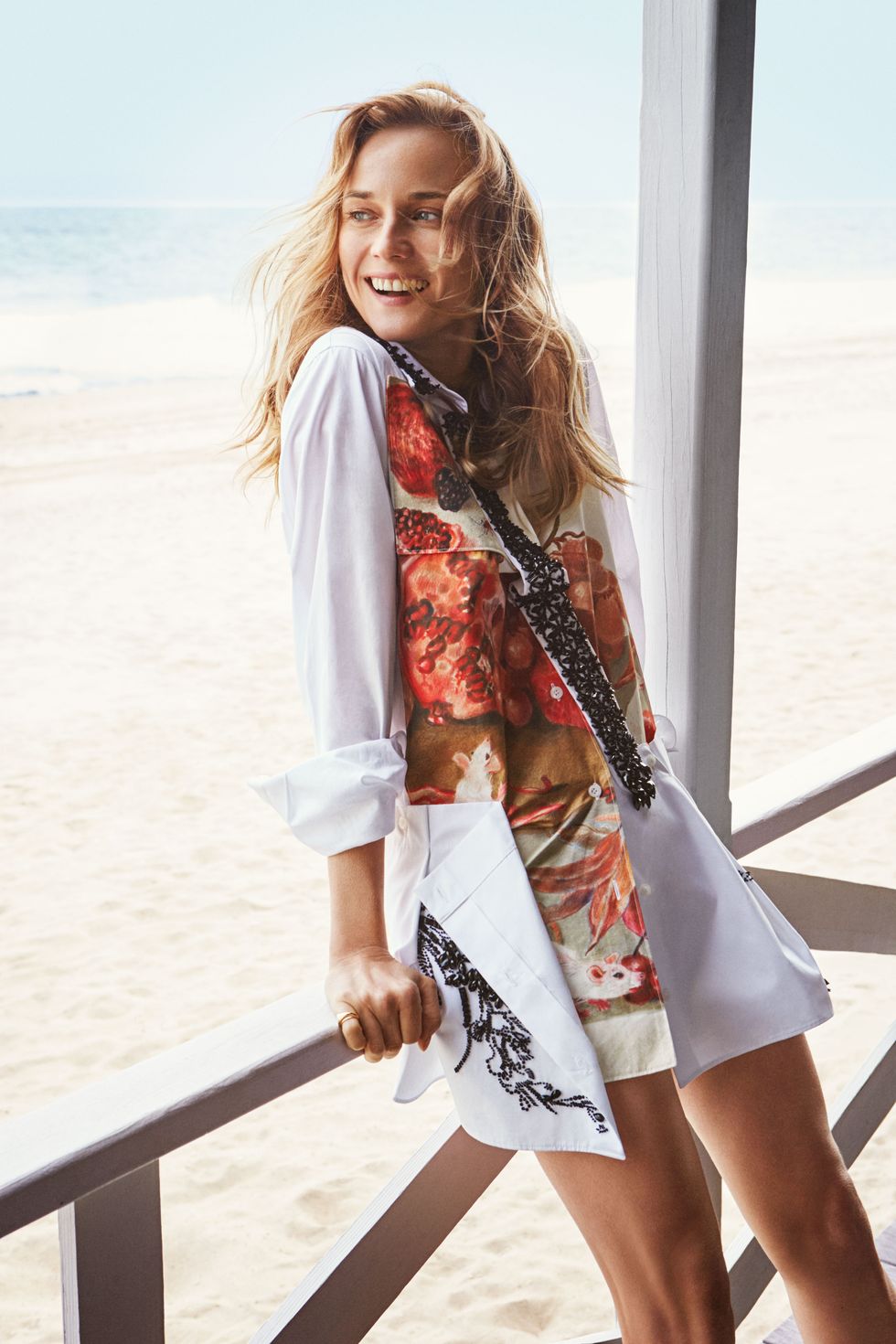You might recall her looking regal in geometric Prabal Gurung at a Metropolitan Opera opening. Goddess-like in embellished Prada in Cannes. Resplendent in pink Lacroix at a Golden Globes ceremony. Effortless in a floral Erdem jumpsuit at a fundraiser. Flawless in a red lip and mustard siren gown by her pal Jason Wu as she joined her Inglourious Basterds castmates accepting a SAG award. When it comes to the red carpet, Diane Kruger can be relied upon to kill it.
She does not disappoint, it turns out, even on a regular old Saturday morning of errands. On a recent one, the German actress arrives at Tokyobike, on the corner of Bowery and Prince Street in New York, a small white space full of brightly hued bike frames, luscious leather seats, retro-sleek accessories, and bearded hipster customers. Kruger crosses the store's threshold in denim shorts, a chunky ivory sweater, a small quilted Chanel cross-body bag, a black Isabel Marant newsboy cap, and a pair of black suede thigh-high boots sure to launch a thousand cases of whiplash. She is quite obviously the coolest thing ever to have happened to this absurdly cool shop.
"I'm so excited!" she exclaims girlishly. Are we here to browse or buy? "Oh, I'm going home with a bike today."
In addition to a pad in Paris and the house they have in Los Angeles, Kruger and her longtime partner, the actor Joshua Jackson, have acquired a one-bedroom East Village pied-à-terre, and she has fantasies of ferrying home groceries on a shiny new bicycle and cooking for the dinner parties she likes to host. She's a big Ina Garten fan and loves to make "a curry, or lamb with mushed minted peas—that's really easy," she says. And drink lots of wine. What about the guest list? Does she have a lot of friends in the biz? "Enough," she says with a withering laugh. "Maybe three or four whom I've collected over the past 10 years."
It is not surprising that Kruger, a former model turned Tarantino femme fatale, who will readily forgo a clichéd role in a Hollywood film for a meaty one in a French one, oozes good-taste-with-an-edge. (Later she will show me the T-shirt under her sweater, marked with the words "Fuk U," and her smartphone case, which is made to look like cigarettes in a Chanel-branded package. "It's a fake. I bought it off the street," says the 40-year-old face of Chanel skincare and friend of Karl Lagerfeld as she happily stuffs it back into the real Chanel bag.)
Less expected is how honest and grounded she is. "Diane is not a collector of fools," says Bryan Cranston, who became pals with Kruger on the set of this summer's The Infiltrator, which is based on a true story about U.S. customs officials who go undercover to take down associates of Pablo Escobar. "She has a sharp wit and tongue. But she doesn't have a guard up—she was very open and casual with me. She doesn't have an air. That was a really nice discovery, to be honest with you."
Kruger, who also stars in this month's French-language thriller Disorder, confesses that this was not always the case. She did start out humbly, growing up lower—middle-class in a small German town, where she lived with her mother and younger brother (her father was largely absent), and first tasted glamour when she moved to Paris to model at 15, after a knee injury ended her ballet dreams. "Home was difficult. I was resentful toward my dad. I was a really angry kid," she says. "Ballet gave me this huge outlet, in retrospect, to get my emotions out. Once it stopped, I was totally lost."
An eventual love of fashion aside, modeling itself did not fill the void. "But this whole other life opened for me in Paris. I met actors; I watched films. When I was growing up, the movie theater was 20 miles from my house. I spent every day watching The Nanny." (Kruger, charmingly, remains a Fran Drescher fan. Once she saw the actress in a restaurant but was too starstruck to introduce herself.) "After a few years in Paris I realized I wanted to go to drama school."
A burgeoning film career coincided with her marriage to French actor-director Guillaume Canet, at age 25. Suddenly she was European celebrity royalty, and her role as Helen of Troy in Troy (despite less than stellar reviews), combined with her fashion prowess, turned her into an American celebrity, too. But only a few years later, with her marriage in decline, she had a sort of identity crisis. "I had become arrogant. I had been a model, I spoke three languages, I had a career. I felt I had figured it all out. And then I realized that I was living this very privileged life in my own bubble that I created and I don't know anything about what's really going on in the world and I don't ask enough questions."
The solution was to do something in her personal life that she has also come to do rather well in her career: take risks. Kruger's last overtly commercial film (National Treasure: Book of Secrets) came out in 2007; otherwise, she is drawn to dark, complicated, challenging roles—perhaps none more famous than Bridget von Hammersmark in Quentin Tarantino's Inglourious Basterds, a tough-as-nails screen siren during the Third Reich who spies for the Allies.
She began to seek out challenge offscreen, too. "I made a lot of different choices," she says. "I cut people out of my life who I felt were enabling my bubble." She also started dating Jackson. "Meeting someone like my partner, who has a very different perspective, who likes to travel in a different way and be open to various experiences, was so important. I was 30 years old and I was already bored of fancy hotels."
This spring saw the release of Sky, the third film Kruger has done with her close friend and producing partner, the French director Fabienne Berthaud. In it she plays a French tourist who leaves her jerk husband in the middle of an American road trip. It was filmed in the small desert town of Barstow, California, and the experience echoed real-life road trips Kruger has taken through places like Kentucky and South Dakota. "It's humbling to see how different life can be from what I know in New York or L.A. The values in those smaller places are what I grew up with, and they are still very much what I identify with, even if it's not what my daily life is anymore."
Some reviews of Sky criticized Kruger's character, Romy, for using her newfound freedom to shack up with another less than ideal mate, played by Norman Reedus. (Last winter rumors of a Reedus-Kruger makeout session made the tabloid rounds, an incident about which she speaks with the expected mix of caution and exasperation.) Asked about the charge that her character is somehow an affront to feminism, she rolls her eyes. "Love is the most important thing in life, and it happens when you least expect it. I feel like people have a bad understanding of what feminism actually means."
To be clear, Kruger is a feminist. She can't vote in the U.S., but she's a Hillary fan ("though I'd vote for Bernie if I felt he could get anything done"), and she's particularly attuned to issues of fair pay and treatment on the job. "I have yet to be paid the same amount as a male co-star. And absolutely I've been labeled a bitch, or difficult to work with, when I've spoken up about something," she says. "Or it's, 'She doesn't really know what she's talking about.' "
On the American version of the Scandinavian crime series The Bridge, which aired on FX in 2013 and 2014, Kruger starred as Sonya Cross, a detective with Asperger's syndrome, for which she trained with a consultant who himself has Asperger's. "Something I learned that is shocking is that girls are less often diagnosed with it because there's this stigma that girls are just being bitches." She pauses. "Maybe that's why they cast me. I can be very direct."
"Diane has no pretensions," says Jason Wu from his New York office, where inspiration boards are covered with images of Kruger, the muse for his forthcoming casual line, Grey. "She's very straightforward, as am I, and that's why we're friends."
Indeed, back at Tokyobike Kruger is rattling off her choices to the salesman like a woman who knows what she wants. Turquoise frame, wicker basket, cute silver bell. She doesn't like wearing a helmet, she says, as we pass a display of them. When the salesman later asks her if she'd like to purchase one, she chirps, "I already have one at home," shooting me a conspiratorial look.
Unfortunately, the bike will not get much use this summer. In a couple of weeks Kruger is off to the south of France to play Catherine Deneuve's daughter in a French thriller. And then she'll return to her homeland to star in her first German-language film, helmed by the German-Turkish director Fatih Akin, who is known for his works on refugees and ethnic minorities, and whom Kruger deeply admires. "It's a hardcore film. Just a really dark, dark part. I'm so scared to do it," she admits.
But first Kruger and her thigh-high boots are off to Victoria's Secret to pick up some nipple covers; tonight she'll be wearing a fairly transparent Prabal Gurung dress to accompany the designer to the GLAAD awards. She selected the frock herself, as usual. She understands why some people might have use for a stylist, but she's not one of them. "I just feel like it's not that hard," she says, "to know what you like."
Photographs by Victor Demarchelier and styling by Nicoletta Santoro
Once upon a time, to get from Manhattan to the Hamptons (where this story was shot) on a sweltering summer Friday, you had just a couple of options: an hours-long snake on the LIE or a packed LIRR train. Helicopters were for tycoons and their opportunistic friends, until Blade came along and democratized them—to a degree. But can you really put a value on the time (and sanity) you'll save? New York city to Long island From $495; flyblade.com.

